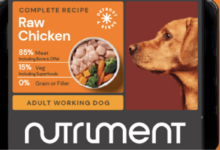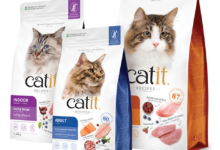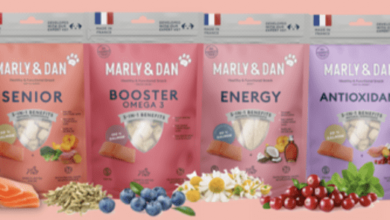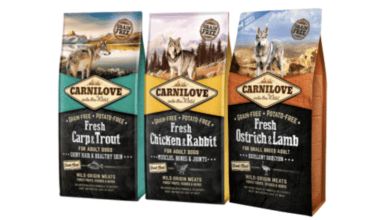Dogs go vegan: The plant-based diet and the pet food industry
Society is seeing an increase in popularity of the plant-based diet for pets, with health benefits as well as providing a continued solution for global warming, a vegan diet for dogs may be the way forward

It goes without saying that a plant-based diet has become conventional in society. From 2010 to 2020 the vegan population in the UK increased by 350% after it became clear that action needed to be taken against climate change. In fact, pet food manufacturer Percuro mentions that ‘eating a plant-based diet is the single biggest way to reduce our environmental impact’, according to a recent study by the University of Oxford. We soon learned that as well as providing a long-term solution to reduce our carbon footprint, a vegan diet also contributes various health benefits. Indeed veganism is so well supported that in 2019, January marked the beginning of a new campaign known as ‘veganuary’ that saw 125,000 people in the UK pledge to a meat-free diet for the entire month.
It is unsurprising then that plant-based diets are becoming widely championed by the general public. What may be surprising however, is that this is starting to also leak over to the pet food industry.
The plant-based concept has recently taken to the pet food sector in a bid to further tackle the worldwide threat that is climate change.
In 2020 the vegan pet food market was valued at £6.4bn and is projected to reach £11.3bn by 2028, amid a recent surge in the number of vegan pet food manufacturers and established pet brands offering new vegan ranges. In addition, a number of large-scale pet retailers such as Pet Value and Pet Smart are already heavily invested in the concept and prominent e-commerce retailers, Amazon and Ebay also offer plant-based ranges for dogs.
We are seeing an increasing gap in the market, as well as an increasing need for plant-based pet food. “It is clear that the vegan population is growing very fast. We have seen a number of pet parents searching for vegan pet foods and ending up on our site,” says Iwan Tamm, chief marketing officer at Percuro. “Vegan pet food is popping up so quickly because of the strong pet food humanization trends following the growth of veganism among their pet parents” adds Tamm. There is also an increase in consumer awareness of the health consequences of eating meat-based products, according to Percuro, as well as the ethical and environmental impact on the livestock industry.
So why do people feel there is a sudden need for pets to eat a plant-based diet, is it not a bit extreme? According to Percuro, dogs and cats are responsible for the consumption of 20% of the world’s meat and fish which accounts for one eighth of carbon emissions, and on top of that, processes involved in meat production are extremely detrimental, contributing to habitat destruction, climate change and animal testing. “Pets leave a huge carbon ‘pawprint’ on our earth, driven in most part by the traditional livestock ingredients,” urges Tamm.
Percuro went about setting itself a challenge to create the next-generation pet food for conscious pet parents, featuring only plant-based ingredients plus an innovative and sustainable protein source.
But can a dog survive without a meat-induced diet? Dogs, like humans, are omnivores, contrary to the popular belief that they only eat meat. They are able to acquire 99.9% of proteins, minerals and essential amino acids needed from a plant-based diet, and not only that, Tamm says “there are a lot of nasties that can end up in meat-based products, especially if you think about the latest trend in raw food.” In particular, “chicken, beef and dairy can cause a variety of issues, such as, itchy skin, loose stools, diarrhea and even vomiting” warns Tamm, whereas plant-based foods are anti-inflammatory as well as easy to digest, which is vital for dogs’ sensitive stomachs.
So why do some people still feel a meat-induced diet is important for their pets? While some vets may recommend a vegan diet, “it is not common,” says Tamm, and even though some of these health benefits apply for cats, “cats are carnivores which means a diet without meat is not something they can survive on.” Since the amino acid taurine is only accessible through an animal source, Tam says, “if cats do not eat meat they will have a taurine deficiency which can cause certain diseases and even be fatal.”
A vegan diet can avoid the hazards associated with meat-based diets to some extent, however unless they are nutritionally complete and reasonably balanced, cats and dogs will incur the hazard of malnutrition, according to a recent study by Clive Phillips, academic editor. The disease ‘dilated cardiomyopathy’ is potentially fatal and affects about 2% of all dogs, appearing mostly in large and giant breeds. It can be caused due to a lack of sufficient cardiac L-Carnitine, which can only be attained through red meat. The study also shows a fully vegan diet can lead to urinary obstruction as plants are relatively deficient in acidifying amino acids and due to the higher pH of plant-based protein, a vegan diet can result in the formation of stones in the urinary system, which can be life threatening.
However, regarding a plant-based diet for dogs, Tamm says, “the only nutrient that needs to be added to a vegan diet to comply with FEDIAF nutritional guidelines is vitamin D3, which can be easily found in liver, fish oil and sheep’s wool.”
A vegan diet is “recommended by some veterinarians”, according to Percuro, and one of the key reasons being is that it is allergy-friendly. Tractive recently took to the topic and found a wealth of benefits by shifting to a vegan diet for dogs, including fresher smelling stools, lower risk of articular gout, a complete eradication of digestive issues, less disease prone and a reduction in water consumption, with current production of 1kg of beef needing 15 litres of water.
In addition, from a health point of view Tamm says “a vegan diet substitutes meat with lots of other good foods such as beans, peas, nuts.” It is overall healthier than a meat-based diet and also helps maintain weight and diabetes, as well as supporting healthcare to become more sustainable. Some people would say veganism’s transition into the pet food industry has not come about by accident. As well as providing endless health benefits, a vegan diet also improves the environment; a vegan diet means “less cows, less methane, less deforestation, more biodiversity, less fishing and less plastic pollution,” according to Tamm.
It is clear a growing body of evidence indicates that pets can adapt to ‘nutritionally-sound’ plant-based foods and while there is some debate around defects such as a taurine deficiency in cats and incomplete nutrients in both cats and dogs, with a large emphasis placed on eradicating climate change and statistics already showing veganism is leaking into the pet food industry, it would be fair to say there is growing popularity for vegan alternatives.
It has been established that in order for dogs and cats to thrive within modern environments, they must be provided with diets that are sufficiently palatable, bioavailable, nutritionally complete and reasonably balanced. Therefore it may be that we see, not a complete shift to a plant-based diet, but an increase in diets for pets incorporating a mixture between both plant-based and meat-based produce, and it is likely we will see more pet retailers and manufacturers offering meat-based alternatives.













